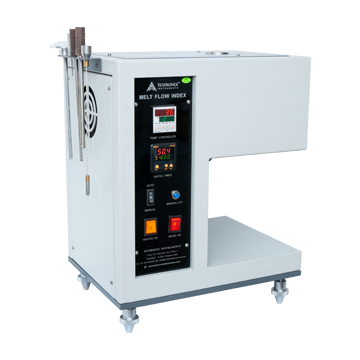The Melt Flow Index Tester is a magical device that helps us understand how melt flow works in polymers. Because, you know, understanding flow properties is super important when it comes to polymers. Measuring the melt flow index helps us ensure consistent product quality.
Components of a Melt Flow Index Tester
- Inside the belly of a Melt Flow Index Tester, you will find a barrel, a screw, and a die – the essential elements needed to turn solid plastic into a molten state.
- The barrel acts as the melting pot where the polymer is heated up to a specific temperature.
- The screw pushes the molten polymer through the die which determines the shape and size of the flow.
Step-by-step process of conducting a test
- First, we load a specific amount of polymer into the barrel ensuring it is free from any contaminants (like invisible gnomes or an epic love story).
- Then, we set the temperature and apply a standardized load to the polymer forcing it to flow through the die.
- As the molten polymer gracefully emerges, the Melt Flow Indexer measures the time it takes for a certain amount of polymer to flow out.
Interpreting Melt Flow Index Results
So, you have conducted the Melt Flow Index (MFI) test and now you have a bunch of numbers in front of you, but what do they actually mean?
The MFI value indicates how easily a polymer can flow under a specific temperature and pressure. Greater MFI values suggest that the polymer has a higher flowability, while lower values indicate a more viscous material.
Next, let’s categorize polymers based on their MFI. This classification helps in determining the processing characteristics and end-use applications of different polymers. Low MFI materials, for example, are often used for manufacturing structural components that require strength and rigidity. High MFI polymers may find their place in injection molding applications where flowability is crucial.
The MFI values are influenced by several factors such as molecular weight, additives, and even moisture content. So, a polymer with a higher molecular weight will typically have a lower MFI value indicating a more viscous material.
Remember, the MFI test is not just about numbers, it is about understanding how polymers flow and behave. So embrace the quirky realm of MFI results and let your polymers flow freely!
Applications of Melt Flow Index Testing
When it comes to ensuring quality control in polymer manufacturing, the Melt Flow Index (MFI) test is a game-changer. This nifty little test helps manufacturers maintain consistent product quality by measuring the flow properties of polymers.
But that is not all! MFI tester also allows us to determine whether a particular polymer is suitable for specific applications. We would not want a polymer that flows like molasses for something that requires a more fluid consistency, right? MFI testing helps us avoid that sticky situation.
Comparative analysis of different polymer materials becomes a piece of cake with MFI testing. We can easily evaluate and compare the flow properties of various polymers enabling us to make informed decisions about which material is best suited for a specific application.
So, to sum it up, MFI testing serves not just as a quality control tool but also as a decision-making companion. It helps us ensure that polymer manufacturing is up to par, determine material suitability, and compare different polymer materials.
The importance of the melt flow index (MFI) in the polymer industry cannot be overstated. It allows manufacturers to assess and compare the flow properties of different polymer materials ensuring that the right materials are used for specific applications. MFI testing also plays a crucial role in quality control and enables manufacturers to maintain consistent product quality and identify any issues early on.
In conclusion,
The Melt Flow Index Tester emerges as an indispensable tool in the realm of polymer analysis, playing a pivotal role in evaluating the flow properties of these materials. Its ability to assess the melt flow rate provides valuable insights for industries working with polymers, aiding in quality control and ensuring the optimal performance of end products. The precision and efficiency offered by this testing apparatus make it an essential component of the polymer manufacturing and processing landscape. As technology continues to advance, the Melt Flow Index Tester stands as a cornerstone, facilitating the enhancement of polymer-based materials and contributing to the overall advancement of various industries.




